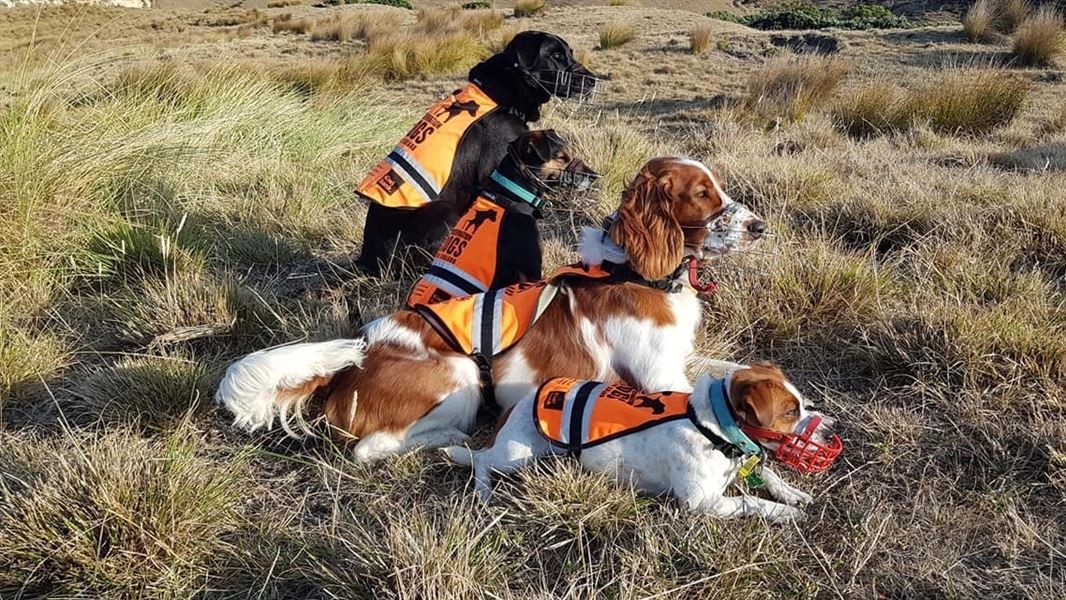Archived content: This media release was accurate on the date of publication.
Date: 03 February 2021
The potential risk more America’s Cup spectators bring to pest free islands in the Hauraki Gulf is being tackled head-on by conservation dogs from DOC and Auckland Council with the support of Kiwibank.
The Hauraki Gulf has 47 pest-free islands which are home to threatened native species including takahē, Coromandel brown kiwi, tīeke/saddleback, pōpokotea/whitehead, tūturuatu/shore plover and pāteke/brown teal.
Rats getting established on these islands would be devastating to the vulnerable bird populations.
DOC Pest Detection Dog Ranger Hannah Johnston says an increased number of rangers and dog handlers will be present on the islands during America’s Cup race days to detect any pests spectators may bring in from their boats and/or cargo.
Teams of dog handlers will be based on Motutapu, Rangitoto and Motuihe. Spectators hoping to catch views from these islands will be met by rangers and conservation dogs to double check gear and vessels of any pests.
“Through the support of Kiwibank, who are our Conservation Dogs Programme national partner and also an exclusive supplier to Emirates Team New Zealand, we were able to increase our numbers of pest dog handlers to deal with the high numbers of island visitors during the America’s Cup period.
“Conservation dogs are a brilliant tool for advocacy and raising awareness of the importance of keeping pests off the Hauraki Gulf Islands and they are a tool that can be utilised if any incursions occur.”
The Conservation Dogs Programme uses highly trained dogs and their handlers to detect New Zealand’s protected species or unwanted pests. Well trained dog-handler teams have successfully been used for conservation for more than 40 years.
DOC Senior Biodiversity Ranger David Wilson says it is great to see people out and about during these exciting times.
“But it’s extremely important we do not put threatened wildlife at risk by carrying unwanted pests or other threats, such as pet cats and dogs, to these sanctuaries. The Conservation Dogs Programme will help us keep these islands predator free and safe for our protected species.”
When visiting pest-free islands people are strictly prohibited from bringing with them any pets and must check their gear for any pests such as rats or insects.
More information
Visiting pest free islands
When visiting pest free islands or islands that are becoming pest-free, make sure you check your gear before you leave the mainland.
- Check your gear for pests such as rodents and insects
- Clean footwear and gear, removing soil and seeds
- Seal ensure your gear is zipped up (no open bags)
When you arrive on a pest-free island, you may be met by rangers to recheck your gear. Dogs are not allowed on island reserves in the Bay of Islands, Hauraki Gulf, and Marlborough Sounds islands. Check specific rules for a place before you visit.
Conservation dogs
Well trained dog-handler teams have successfully been used for conservation for more than 40 years. New Zealand was the first country to use dogs to benefit conservation as far back as the 1890s.
Today, the Conservation Dogs Programme delivers services nationwide in partnership with Kiwibank.
Work undertaken includes:
- protecting the Hauraki Gulf and other pest-free islands from introduced pests
- helping monitor kiwi, blue duck/whio and kea on the West Coast.
The dog-handler teams are trained to sniff out either:
- protected species (mainly birds) for survey, to be monitored and/or moved to another place, or
- pest species (eg rodents, mustelids, Argentine ants, weeds) that would destroy our native wildlife in pest-free areas.
Contact
For media enquiries contact:
Email: media@doc.govt.nz
